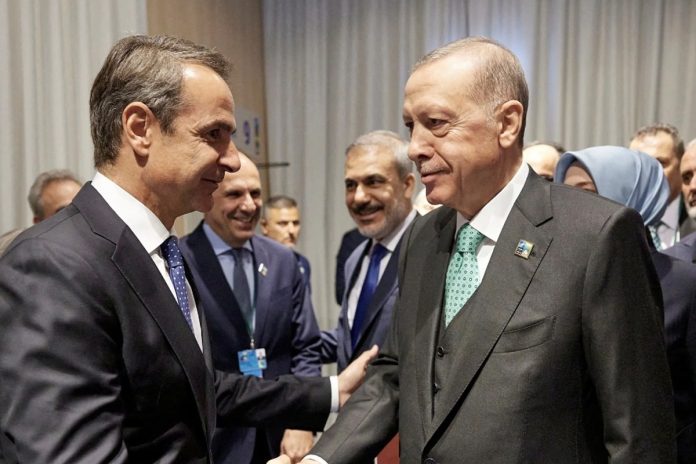Over recent years, the Gulf states have shown an increasing interest in the Eastern Mediterranean, a region marked by escalating tensions between Turkey and Greece. Initially, their involvement coincided with the heightening rivalry over drilling rights, drawing the Gulf states into the conflict as they aligned themselves with the opposing parties. The strategic alliances formed during this period have had significant geopolitical ramifications, influencing the region’s dynamics and prompting a re-evaluation of relationships and interests.
The strained relations between Turkey and Greece over drilling rights in the Eastern Mediterranean notably intensified the interactions between Greece and the Gulf states, particularly Saudi Arabia and the UAE. In February 2021, Bahrain, Saudi Arabia, and the UAE participated in the Philia Forum in Athens. This event, symbolically named after the Greek word for friendship, also included Egypt, France, and the Greek Cypriot administration, creating unease in Ankara. The participation of these countries highlighted their collective stance, further straining Turkey’s relations with many of the forum’s participants.
Furthermore, the establishment of the East Mediterranean Gas Forum in 2019, which institutionalized cooperation between Greece, Israel, and Arab states, excluded Turkey due to its contentious relationships with most member states. This exclusion intensified Turkey’s concerns, especially given the forum’s focus on regional energy cooperation and security. The growing convergence among these states posed a significant challenge to Turkey’s strategic interests in the Eastern Mediterranean, exacerbating tensions with Greece.
However, the geopolitical landscape has significantly shifted since those tense times. Since 2021, Turkey has embarked on a comprehensive normalization process with several key players in the region, including the Gulf states, Egypt, and Israel. This normalization has been crucial in disentangling these countries from the Turkish-Greek dispute in the Eastern Mediterranean. The recent rapprochement between Turkey and Greece marks the near completion of Turkey’s regional normalization efforts.
A pivotal development in this context is the recent meeting between Greek Prime Minister Kyriakos Mitsotakis and Turkish President Recep Tayyip Erdogan in Ankara. This meeting, their fourth within a year, symbolizes a significant step towards strengthening the normalization process. Both leaders, having been re-elected last year, have committed to setting aside longstanding disputes to focus on areas of mutual agreement. They underscored that there are “no unsolvable problems” between their countries, signaling a willingness to compartmentalize issues and build a new era based on a “positive agenda.”
This positive agenda includes cooperation in various domains such as trade, energy, education, and culture. The collaboration is already showing tangible results, particularly in managing migrant flows and boosting tourism. Mitsotakis has pledged Greece’s support for additional EU funding to Turkey to address the migrant issue. Additionally, the increasing number of Turkish tourists visiting the Greek islands in the eastern Aegean is fostering stronger political, economic, and cultural ties between the two countries.
The evolving dynamics in the Eastern Mediterranean are expected to impact other stakeholders with vested interests in the region, notably the Gulf states. Initially, their increased involvement was partly driven by regional rivalries and geopolitical tensions. However, it is essential to recognize that shared antagonism toward Turkey was not the sole impetus for their engagement. Historically, the relationship between the Gulf and the Eastern Mediterranean was primarily economic and trade-oriented, albeit on a modest scale.
The Gulf states’ interests in the Eastern Mediterranean should be analyzed within a broader international, regional, and local context. Their growing focus on the region reflects their expanding ambitions and the evolving geopolitical dynamics. On the international front, closer ties between Gulf states and EU countries, particularly Greece, align with the reassessment of US policy in the region following the uncertainties of the Trump and Biden presidencies. Regionally, these ties developed during a period of strained relations with Turkey. However, the Gulf states are now building substantial political and economic capital in their relationships with Ankara through comprehensive free trade agreements, strategic dialogue mechanisms, and defense collaborations. Notably, stronger ties with Turkey will not be at the expense of their burgeoning relationships with Greece, as the Gulf states aim to increase their number of partners in the region.
The normalization of Turkish-Greek relations presents a win-win scenario, especially against the backdrop of Israel’s war in Gaza, which threatens the security of the Eastern Mediterranean. Before the Gaza conflict, the discovery of natural gas in the area offered promising development opportunities. However, the prolongation of the Gaza war poses potential risks to the interests of Turkey, Greece, and the Gulf states. The Gulf states, currently diversifying their domestic and foreign policies according to various “Vision” plans, see closer ties with both Turkey and Greece as crucial to extending their soft power. The cultural and tourism sectors play a central role in their efforts to diversify their economies away from oil.
Moreover, the Gulf states could contribute to a more moderate atmosphere in Turkish-Greek relations and strengthen the positive agenda. This could begin with Turkey’s inclusion in cooperation and friendship mechanisms in the Eastern Mediterranean, fostering an interconnected regional framework. From energy cooperation to maritime security, and from tourism to trade, there are numerous initiatives that the Turkey-Gulf-Greece trio can explore.
The security landscape of the Eastern Mediterranean will be significantly influenced by two contradictory trends: the challenges posed by Israel’s war in Gaza and the opportunities arising from improving Turkish-Greek relations. While the former presents significant hurdles, the latter offers promising prospects for the Gulf states, potentially paving the way for a more collaborative and prosperous region.




